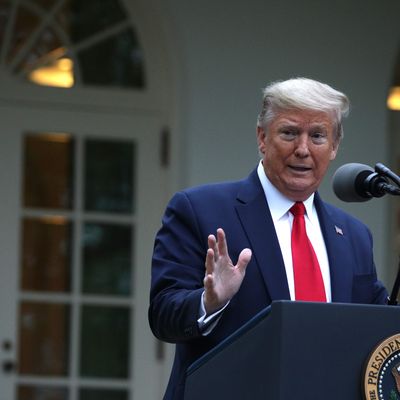
We’re committed to keeping our readers informed.
We’ve removed our paywall from essential coronavirus news stories. Become a subscriber to support our journalists. Subscribe now.
On March 13, the day that he announced social-distancing measures after essentially ignoring the emerging crisis for over a month, President Trump responded to a question about accountability for the federal government’s failure, saying, “I don’t take responsibility at all.” Over 25,000 American deaths later, the president appears to be sticking to that philosophy. According to a report from the Washington Post, Trump’s strategy for reopening the economy involves bringing in several unofficial advisers so he can spread the blame around if the plan to reopen results in an immediate second outbreak and unnecessary death.
The report states that White House advisers are attempting to “shield the president from political accountability” by “trying to mobilize business executives, economists, and other prominent figures to buy into the eventual White House plan, so that if it does not work, the blame can be shared broadly.” Among those lucky enough to be considered for the roll of fall guy is former Treasury secretary Henry Paulson, who oversaw the $700 billion bailout in 2008.
As for when the president is looking to reopen, it’s looking like a little more than two weeks away. “He desperately wants to reopen as much as possible on May 1,” a former White House official told the Post regarding the current discussions. “He’s been that way from the beginning, and he has not wavered. He seems determined to do it. But there’s a growing realization that you won’t be able to open everything up by May 1. Even he realizes that’s a bad idea.”
On Tuesday, the Washington Post also published a draft of a road map to reopen developed primarily by the Federal Emergency Management Agency and the Centers for Disease Control and Prevention. According to the paper’s summary, the plan consists of three phases: “Preparing the nation to reopen with a national communication campaign and community readiness assessment until May 1. Then, the effort through May 15 would involve ramping up manufacturing of testing kits and personal protective equipment and increasing emergency funding. Then staged reopenings would begin, depending on local conditions. The plan does not give dates for reopenings but specified ‘not before May 1.’”
It’s not only the Trump administration that is working out the details of reopening: In a moment of federalist collaboration on both coasts, states are working in groups to determine how to slowly reopen the economy. In the West, California, Oregon, and Washington are building a framework for how to end the shutdown in accordance with the standards of “science and public health, not politics,” according to Governor Gavin Newsom. On the East Coast, a consortium of seven states — New York, New Jersey, Connecticut, Pennsylvania, Delaware, Massachusetts, and Rhode Island — will work together to open the Atlantic region’s economy. But the Trump administration is alone in its insistence on immediacy regardless of the consequences. “Trump has been so insistent on the reopening that some officials worry only a narrow window exists to provide information to change his mind or to ensure that the effort to reopen does not significantly add to the country’s rising number of infections and deaths,” one senior administration official told the Post.
The White House’s reported share-the-blame strategy is just the latest crisis in which Trump has refused accountability. “I don’t take any,” Trump said in December 2019, regarding any personal responsibility for his nascent impeachment. “Zero, to put it mildly.” Seven months earlier, he boasted of his “total exoneration” from the Mueller report — even if its pages stated otherwise.






























